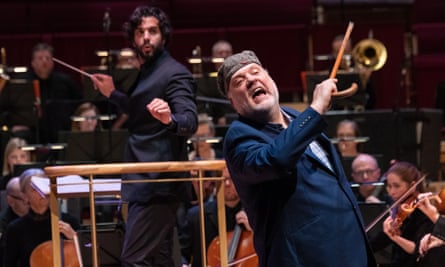The latest collaboration between the Royal Liverpool Philharmonic and the European Opera Centre, also based in Liverpool, is a concert staging of Puccini’s Gianni Schicchi, conducted by Domingo Hindoyan and directed by Bernard Rozet. Bryn Terfel returns to the role of the titular opportunist, which he first sang at Covent Garden in 2007, while the avaricious Donati family, whom he eventually defrauds, are played by the EOC’s young singers.
Rozet is hampered by the need to cramp the action into a narrow strip of space in front of the orchestra, though his direction can be astute, the comedy sometimes very dark indeed. He updates the opera to the 1960s, and his Donatis are a grotesque crew that might have strayed from Fellini or Buñuel, barely attempting even a semblance of grief at Buoso Donati’s death and casually stepping over or kicking his corpse, which is dumped at the foot of Hindoyan’s podium. Terfel’s knowing Schicchi observes them with both irony and contempt before turning on them, eventually driving them from the platform to seek refuge among the audience. He is in fine voice, his performance at once very funny and wonderfully subtle, always leading the young cast around him yet never upstaging them.

There’s some lovely singing elsewhere. Anaïs Constans’s wilful Lauretta can be very much her father’s daughter: O Mio Babbino Caro is tellingly manipulative as well as beautiful; later on, she and Matteo Roma’s Rinuccio sound good together in their duets. Matteo Loi’s camp, fussy Betto is outstanding, as are Indyana Schneider’s bossy Zita and Felipe Cudina’s dim Simone, but this is very much a cogent ensemble where no one really puts a foot wrong. Hindoyan gets the mix of wit and passionate lyricism bang on, too.
With the RLPO on terrific form, he prefaces the opera with intermezzi and dances from other works by Puccini and his contemporaries, making such familiar favourites as Mascagni’s Cavalleria Rusticana Intermezzo and the Dance of the Hours from Ponchielli’s Gioconda sound fresh and newly minted, while the demonic Tregenda from Puccini’s Le Villi is played with thrilling precision and panache.

Comments (…)
Sign in or create your Guardian account to join the discussion